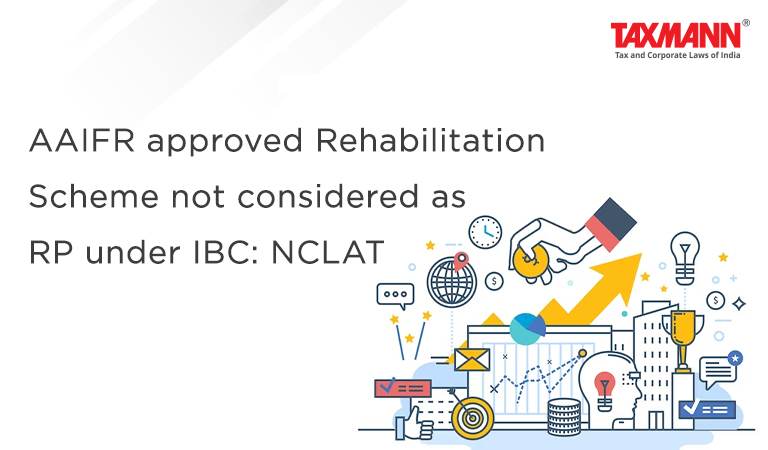AAIFR approved Rehabilitation Scheme not considered as RP under IBC: NCLAT
- Blog|News|Insolvency and Bankruptcy Code|
- 3 Min Read
- By Taxmann
- |
- Last Updated on 13 March, 2023

Case Details: Pramod Kumar Pathak v. ARFAT Petrochemicals (P.) Ltd. - [2023] 148 taxmann.com 61 (NCLAT-New Delhi)
Judiciary and Counsel Details
-
- Justice Ashok Bhushan, Chairperson, Dr Alok Srivastava & Barun Mitra, Technical Member
- Pankaj Jain & Sarthak Dugar, Advs. for the Appellant.
- Arvind Kumar Gupta, Ms Purti Gupta, Ms Henna George & Ms Shivani Sharma, Advs. for the Respondent.
Facts of the Case
In the instant case, the company JK was declared a sick industrial unit by the Board of Industrial and Financial Reconstruction (BIFR). The company JK (corporate debtor) entered into Memorandum of Understanding (MoU) with the respondent, on the basis of which, implementation of rehabilitation scheme was approved by the Appellate Authority for Industrial & Financial Reconstruction (AAIFR).
The appellant, who claimed to be a representative of the workmen union of sick industry JK, filed an application u/s 33 of the IBC before the Adjudicating Authority (NCLT), alleging that the Rehabilitation Scheme had been breached, and thus the corporate debtor should be liquidated.
However, the NCLT concluded that the sanctioned rehabilitation scheme could not be termed as a resolution plan within the meaning of section 5(26) of the IBC and, therefore, there was no question of the respondent committing a breach of the implementation of the plan.
The NCLT rejected the application filed u/s 33 of the IBC. Consequently, the appellant challenged the rejection of the application and relied on the IBC (Removal of Difficulties) Order, 2017, dated 24-5-2017, in support of their submission that the approved Rehabilitation Scheme was a Resolution Plan within the meaning of IBC.
However, the Hon’ble Supreme Court in Spartek Ceramics India Ltd. v. Union of India [2019] 111 taxmann.com 535 had clearly held that the Notification dated 24-5-2017 travelled beyond the scope of removal of difficulties in the provisions.
The NCLAT was of view that when the Notification dated 24-5-2017, was not a valid Notification, there was no occasion to accept the submission that the approved rehabilitation scheme, which was the foundation of the application filed by the appellant under section 33 could be treated as a resolution plan within the meaning of IBC.
NCLAT Held
The NCLAT held that the very foundation of the application filed by the appellant u/s 33 had been knocked out, and therefore, the application was rightly rejected by the Adjudicating Authority.
In view of the above, no error was committed by the Adjudicating Authority in rejecting the application filed by the appellant under sections 33 and 34.
List of Cases Reviewed
-
- Pramod Kumar Pathak v. ARFAT Petrochemicals (P.) Ltd. [2023] 148 taxmann.com 60 (NCLT – Ahd.) (para 20) affirmed [See Annex].
- Spartek Ceramics India Ltd. v. Union of India [2019] 111 taxmann.com 535 (SC) (para 19) followed.
- Ashapura Minechem Ltd. v. UOI [2017] 88 taxmann.com 135 (Delhi) (para 16)
- Girdharilal Sugar and Allied Industries Ltd. v. UOI [2018] 97 taxmann.com 292 (MP.) (para 17) distinguished.
List of Cases Referred to
-
- Pr. Director General of Income-tax v. Spartek Ceramics India Ltd. [2018] 94 taxmann.com 1/148 SCL 450 (NCLAT – New Delhi) (para 3)
- Spartek Ceramics India Ltd. v. Union of India [2019] 111 taxmann.com 535 (SC) (para 3)
- Surendra Singh Hada v. Arfat Petrochemicals (P.) Ltd. [CP (IB) No. 469 of 2018, dated 5-4-2021] (para 3)
- Gail (India) Ltd. v. Neycer India Ltd. [Company Appeal (AT) (Insolvency) No. 294 of 2018, dated 29-1-2019] (para 4)
- Ashapura Minechem Ltd. v. Union of India [2017] 88 taxmann.com 135 (Delhi) (para 16)
- Girdharilal Sugar & Allied Industries Ltd. v. Union of India [2018] 97 taxmann.com 292 (MP.) (para 17).
Disclaimer: The content/information published on the website is only for general information of the user and shall not be construed as legal advice. While the Taxmann has exercised reasonable efforts to ensure the veracity of information/content published, Taxmann shall be under no liability in any manner whatsoever for incorrect information, if any.

Taxmann Publications has a dedicated in-house Research & Editorial Team. This team consists of a team of Chartered Accountants, Company Secretaries, and Lawyers. This team works under the guidance and supervision of editor-in-chief Mr Rakesh Bhargava.
The Research and Editorial Team is responsible for developing reliable and accurate content for the readers. The team follows the six-sigma approach to achieve the benchmark of zero error in its publications and research platforms. The team ensures that the following publication guidelines are thoroughly followed while developing the content:
- The statutory material is obtained only from the authorized and reliable sources
- All the latest developments in the judicial and legislative fields are covered
- Prepare the analytical write-ups on current, controversial, and important issues to help the readers to understand the concept and its implications
- Every content published by Taxmann is complete, accurate and lucid
- All evidence-based statements are supported with proper reference to Section, Circular No., Notification No. or citations
- The golden rules of grammar, style and consistency are thoroughly followed
- Font and size that’s easy to read and remain consistent across all imprint and digital publications are applied



 CA | CS | CMA
CA | CS | CMA
